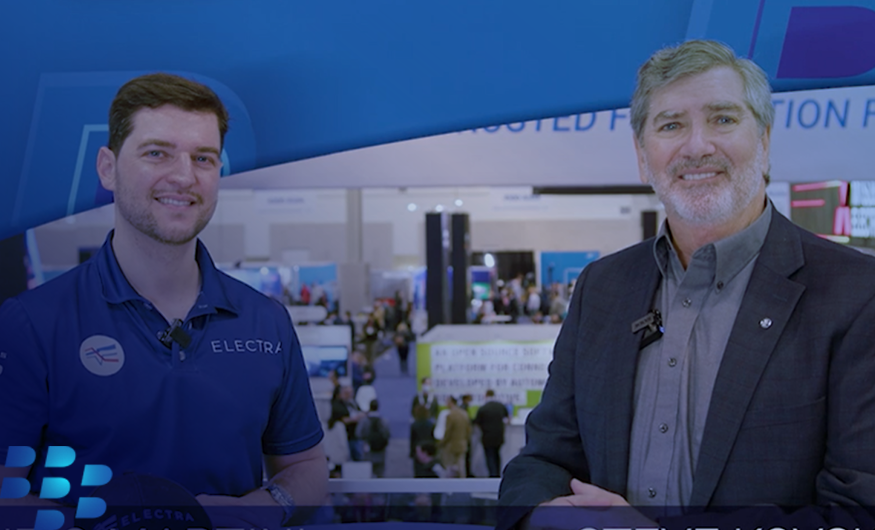How EV Battery Analytics Can Improve the Driving Experience

Electrification and software connectivity are two key pillars of the automotive revolution currently underway. However, these pillars also support each other, with software able to improve the experience of driving an EV, and EVs providing a platform that is readily available for optimization via software. Harnessing this relationship will be key for automakers to delight their customers in the software-defined vehicle era.
Welcome to the Season 2, Episode 2, of “Get In: The Software Defined Vehicle Podcast from BlackBerry.” This series explores the possibilities created by — and technologies behind — the revolution in global transportation we are witnessing today. In this episode, we visit the Consumer Electronics Show 2023 to get an update from Fabrizio Martini, co-founder and CEO of Electra Vehicles, a pioneer in the application of analytics to improve electric vehicle battery performance.
Watch the full Season 2, Episode 2 podcast (below):
We first met Fabrizio in February 2022. He originally developed the ideas for Electra when working at NASA on a project to create an electric rover to explore the surface of Venus. During this work, he realized how important data was when managing the rover’s batteries and predicting failures in this extremely inhospitable environment. The project aimed to improve range and battery lifespan by applying artificial intelligence and machine learning to this data.
Upon leaving NASA, Martini decided to transfer his experience to commercial products. Electra developed a partnership with BlackBerry approximately two years ago to further this plan. Now the technology is being integrated into automobiles and, due to some recent design wins alongside BlackBerry IVY™, it’s ready to start hitting the highways.
“There is a big push towards electric vehicles,” says Martini, “but one of the main drawbacks is battery performance. Everybody wants a longer range, a longer lifetime of their batteries, lower cost, and very high safety. We've seen that we can leverage the data that we're collecting from the battery pack to provide all of this.” This battery optimization feature is one of the key capabilities of Electra Vehicles’ EVE-Ai™ platform.
The partnership with BlackBerry has been instrumental in delivering EVE-Ai to automotive customers, according to Martini, who’s company recently closed a new $21 million funding round with participation from Stellantis Ventures and seed investor BlackBerry Limited.
“Now we’re fully integrated with the BlackBerry IVY solution,” says Martini. “We're able to extend between 20% and 25% extra range with a single charge, as well as potentially doubling the lifetime of the batteries, so we can reduce the number of batteries we utilize and deploy. We can also predict failure up to three months in advance.”
These significant advances in battery optimization offer an added advantage: They require no additional hardware – just software-based data analytics. This is particularly valuable when you consider that the battery is the single most expensive component in an electric vehicle.
At CES® 2023, Electra demonstrated how its IVY™ integration works alongside BlackBerry’s other software platform partnerships, including one with PATEO, a leading Chinese automotive OEM. “We're very happy that PATEO is bringing solutions like IVY and EVE-Ai together into the digital cockpit to improve the range of electric vehicles,” says Martini, adding that the technology can also “estimate very accurately the state of charge of the vehicle, to give the driver the actual remaining mileage that the vehicle has left in its battery.
“Over the last year, since CES 2022, we have improved the digital cockpit so the driver will now see an indication of the recommended speed to follow in order to improve the range,” says Martini. “The driver will receive suggestions whether they need to go a bit faster, a bit slower, or accelerate more smoothly. They can follow this advice to extend the range of their EV.”
Electra’s range-extension suggestions will help considerably with one of the most infamous bugbears of EV ownership: range anxiety. “Drivers will also see the remaining mileage for their trip very accurately,” Martini says. “Their range anxiety will reduce drastically because they can see a very accurate number that will tell them if they can reach home, if they can reach the grocery shop, or if they can reach their office. These are the initial two demos that we are showcasing at CES to illustrate how EVE-Ai has been fully integrated with IVY.”
But the integration is more than just a demo — this technology will be making its way onto production cars shortly, and Electra Vehicles is expanding its team to get ready for rollout. “Electra is growing very fast,” says Martini. “We are reaching 50 people and we're going to double that by the end of this year. We have great partners, including BlackBerry.”
Along with delivering its range assistance technology, the growing company will be working on other driver assistance systems and enhancements for autonomous vehicles. As a result, “We are in full hiring mode to open an office in Europe to support the European market. We are preparing to expand to Asia as well,” Martina says. Anyone interested in working with Electra should head to https://www.electravehicles.com/careers to see current opportunities.
Advantages of EV Platform Integration
“Now that we've fully integrated EVE-Ai to BlackBerry IVY and QNX solutions, we can go to market much more quickly,” says Martini.
Martini’s extensive – in fact, interplanetary — experience with EVs gives him a unique perspective on how transportation and automotive markets on Earth are evolving. He offers this advice for terrestrial automakers. “Focus on software-defined solutions because everything is moving in this direction. Leverage the data that you're collecting. You're collecting tons of data, and that can be fed into AI/ML solutions that can really maximize the performance of your vehicle. Check out the BlackBerry IVY and QNX solutions. They are great. Check out the Electra EVE-Ai solution. The software-defined vehicle is the way to go, and I can't wait to see the next couple of years.”
Despite his personal and professional devotion to optimizing electric vehicles, Martini still has a soft spot for ICE (internal combustion engines). “I love motorcycles and I love a sportscars,” admits the enthusiastic Italian native. “I think there will still be a space for niche sport internal combustion applications.
“But the electric vehicle revolution is happening, and nobody can slow that down. Electrification is getting into motorsports, as well. We are seeing more and more e-bikes, and Formula E (motorsport championship racing), and the Dakar Rally going electric, so it's going to be a lot of fun. They're very high-power vehicles.”
The future of automobiles is software-defined, and at least for the foreseeable future, it’s electric. The promise of these two synergistic trends in transportation becomes even more exciting as they increasingly complement each other to push the envelope of what the next generation of vehicles can accomplish.
